MSI GE60 Review: Mainstream Mobile Maxwell
by Jarred Walton on July 17, 2014 5:00 AM ESTMSI GE60 General Performance
As I've commented already, the presence or lack of an SSD can dramatically alter the end user experience. In this case, the GE60 we're testing doesn't have an SSD and it can feel painfully slow when it comes to booting Windows, installing applications…or running PCMark 7. Versions of the GE60 with an SSD will of course be a different story, but I did run PCMark 7 and 8 on the GE60 and the scores are in the charts below. What you'll see is that PCMark 8 Storage as well as most of the PCMark 7 suite skew heavily in favor of SSDs, which isn't necessarily wrong, but it does make comparisons between HDD and SSD systems largely meaningless with these two benchmarks. Just remember: we're evaluating entire laptops, not individual components.
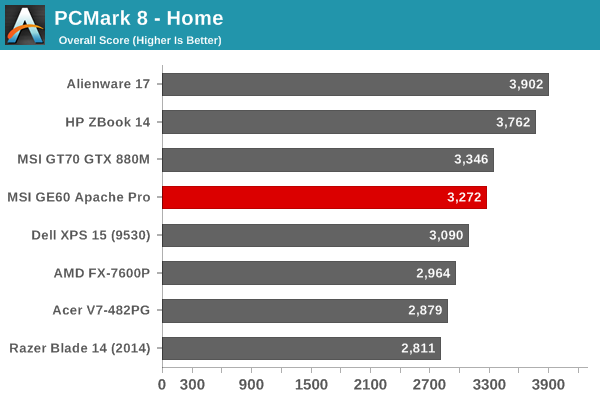
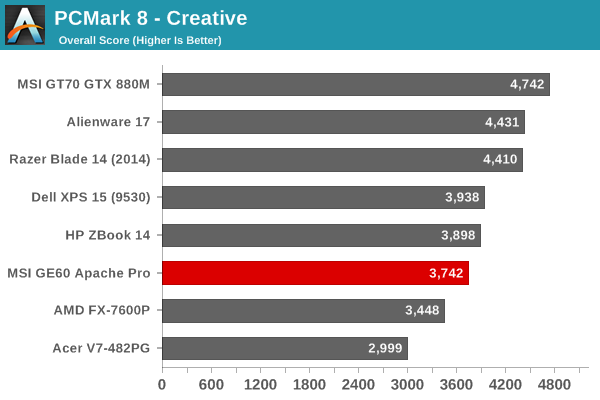
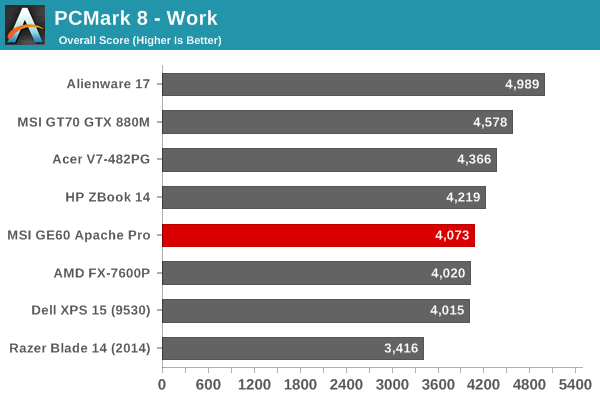
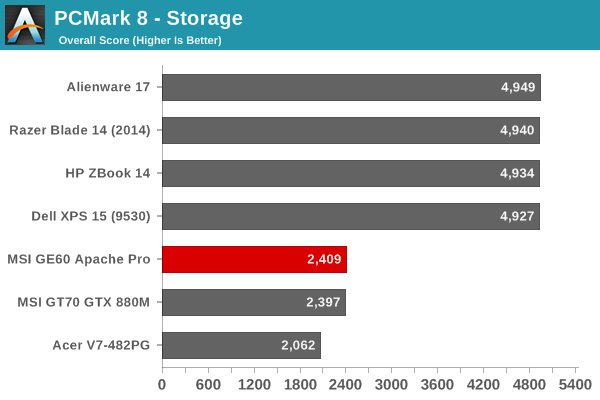
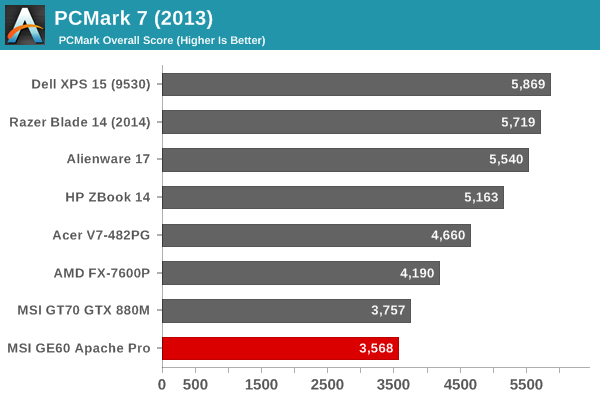
PCMark 8 apparently isn't as SSD biased on most of the tests, which is a bit odd to see. Or maybe Hitachi (who provides the HDD for the GE60 being tested) has done some special tuning to help this specific workload? Normally, about the only thing you can really glean from PCMark scores these days is whether a system is dual-core or quad-core, and whether or not it's using a pure HDD storage solution or something with an SSD (caching or pure SSD). Here, while the GE60 isn't the fastest at PCMark 8, it does beat several quad-core SSD laptops, and I'm not entirely sure why.
The Cinebench, x264 HD encoding, and 3DMark are basically component tests, so scores pretty much scale with the level of the hardware. Not surprisingly, everything falls where you'd expect, with the i7-4700HQ delivering good performance but trailing behind faster CPUs. 3DMark also more or less confirms the performance level of the GTX 860M. You'll also find results of WiFi throughput with several of the notebooks, though there's a huge amount of variance depending on your router, location, and other factors, so take the WiFi performance with a grain of salt. Here are the pertinent charts:
[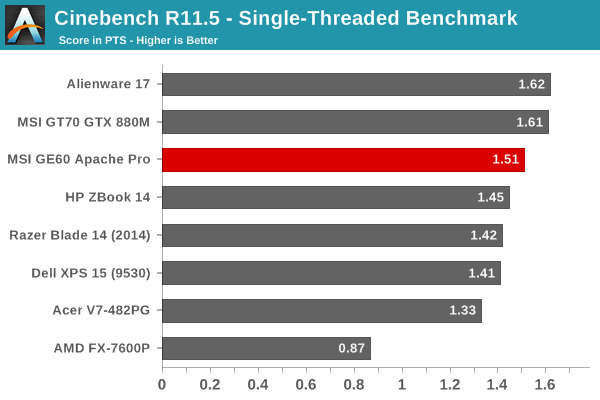
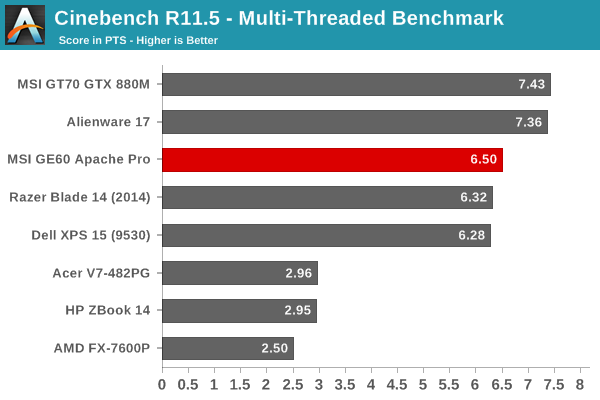
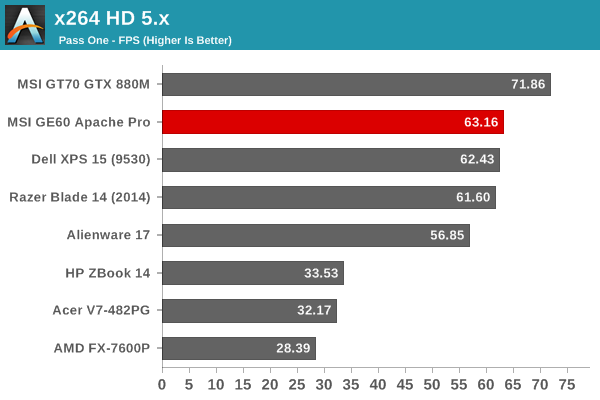
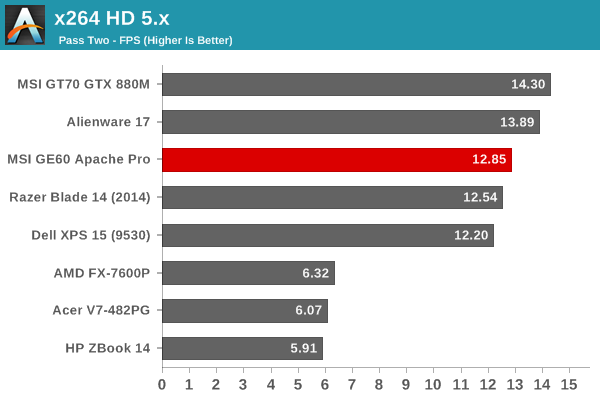
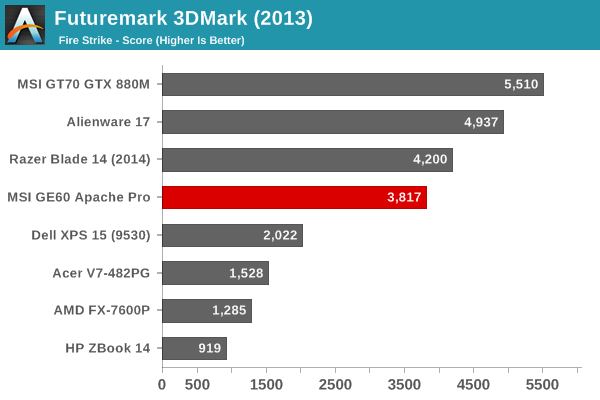
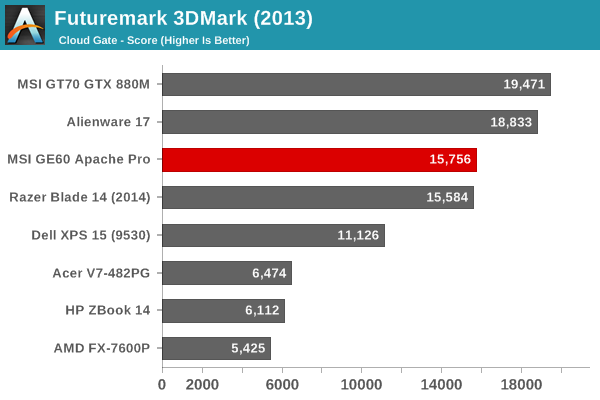
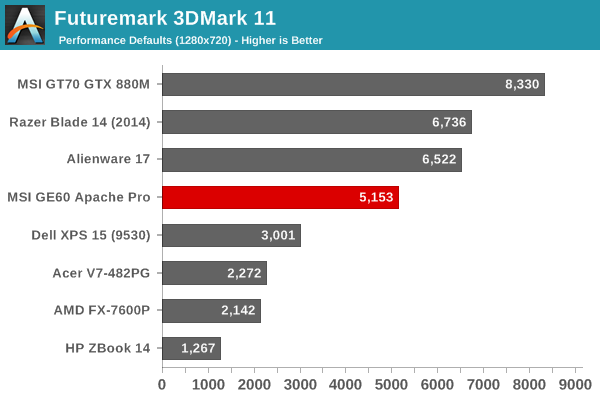
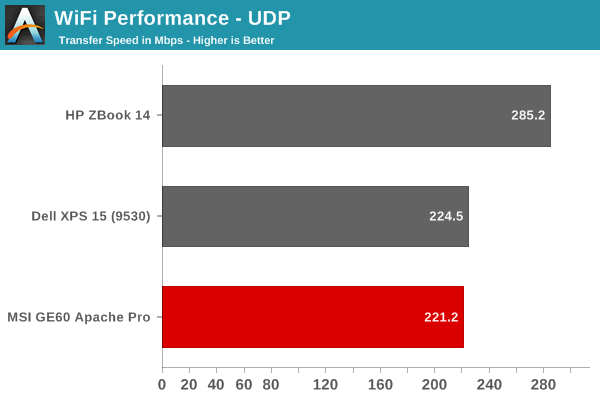










63 Comments
View All Comments
JarredWalton - Thursday, July 17, 2014 - link
The "Mainstream" results are high enough that bumping to 1080p isn't a problem at the settings we use, but then we wouldn't have anything to compare performance against as it's a non-standard setting. If we run one "non-standard" setting, it opens the door to all sorts of other possibilities. Maybe we should use the GFE recommended settings (or AMD's recommended settings) as another item to include?In fact, I'll go ahead and run those and update the Gaming page in a bit with results (as well as details on the precise settings used by GFE). If nothing else, it will be an interesting experiment. :-)
JarredWalton - Thursday, July 17, 2014 - link
Page three is updated with 1080p GFE results, if you're interested.nathanddrews - Friday, July 18, 2014 - link
Thanks for the update, it's very enlightening. A review of GeForce Experience vs Gaming Evolved would be very cool. I know that up until v2.0 or 1.8, GFE automatically targeted 40-60fps with no option to prefer quality (30fps) or performance (60fps) like it does now.https://forums.geforce.com/default/topic/525176/is...
http://www.geforce.com/geforce-experience/faq
Hopefully they update the applications for 120Hz or 144Hz users... or maybe have it target your monitor's refresh rate by default instead? Speaking of which, where are the variable refresh 4K 120Hz monitors? ;-)
DanNeely - Friday, July 18, 2014 - link
First we'd need gpus to implement displayport 1.3 to have the outbound bandwidth. Then until we get another generation of 2x as fast decoder/ldc panel controllers we'll be back to the looks like 2 monitors over MST setup we enjoyed with the first generation of 4k60 panels.xenol - Thursday, July 17, 2014 - link
If I may make a suggestion, please add thermals to laptop reviews. Not just how hot the components get, but how hot each area gets. My primary concern with these thin gaming laptops is that not only would the run really hot inside, but they'll create pockets of hot spots where I don't want them.For example, I had a Dell XPS 15z. Not quite a gaming laptop mind you, but if I fired up a game, the left side of the keyboard would get uncomfortably warm to the point where I had to get a 84-key keyboard so I could play something comfortably.
JarredWalton - Thursday, July 17, 2014 - link
My digital thermometer stopped working properly a while back so I haven't been able to provide numbers. I can order a new one but considering we haven't included surface temperatures for years it didn't seem necessary.JarredWalton - Thursday, July 17, 2014 - link
I was able to use a kitchen thermometer from my wife to do some testing. :-) Page 5 has surface temps now if you're interested.LeapingGnome - Thursday, July 17, 2014 - link
Thank you Jarred. I think surface temps are very important since it is a laptop that many people use in their laps. I appreciate you including them.xenol - a good site is notebookcheck dot net, they do a lot of laptop reviews and always include surface temps from 18 areas of the laptop. Their temps for this MSI look to be 3-4 degrees higher than Jarred saw.
shtldr - Thursday, July 17, 2014 - link
I have the laptop. It has solid CPU, GPU and display. I actually thought the display was some exceptionally good TN.I bought an SSD together with it to replace the HDD... only to find out that opening the laptop voids your warranty!!!
Coming from an Acer laptop which had no such c(r)ap, this was a huge letdown.
JarredWalton - Thursday, July 17, 2014 - link
I've heard (but can't personally verify) that such stickers can't actually be enforced by law, but it's definitely annoying when they try to prevent end users from upgrading things like the RAM and storage. You could always email/call MSI and ask them for confirmation that you can upgrade the RAM/storage first and see what they say -- get it in writing, though! :-)